Most healthy and young dogs do not show signs such as lethargy, loss of appetite or weight loss from pooping blood just once or twice. They become severely lethargic after considerable dehydration, which is definitely not desirable. If your dog is pooping blood but acting normal, it should not stop you from consulting your veterinarian ASAP.
If your dog is pooping blood it is obviously a serious cause for concern, and you should consult your veterinarian ASAP. We can only tell you about 10 possible reasons your dog may be pooping blood, but we cannot treat your dog through an article! It is NOT RECOMMENDED for any pet parent to try home remedies in the case of bloody stools in their dog or pup.
Is Blood in Dog Poop an Emergency?
If you spot blood in your dog’s poop, especially if it’s a lot, happens repeatedly, or is paired with symptoms like vomiting or lethargy, this can be an emergency. Puppies, unvaccinated dogs, and those acting ill should see a vet as soon as possible.
When Should I Call the Vet?
Call your veterinarian if:
- You notice any blood in your dog’s poop, even a small amount.
- Your dog is also vomiting, not eating, or seems very tired or weak.
- The gums look pale or white.
- Your pup is very young or hasn’t had all vaccines.
Don’t wait for symptoms to get worse; quick action can save your pet’s life.
What Are the Signs That It’s Serious?
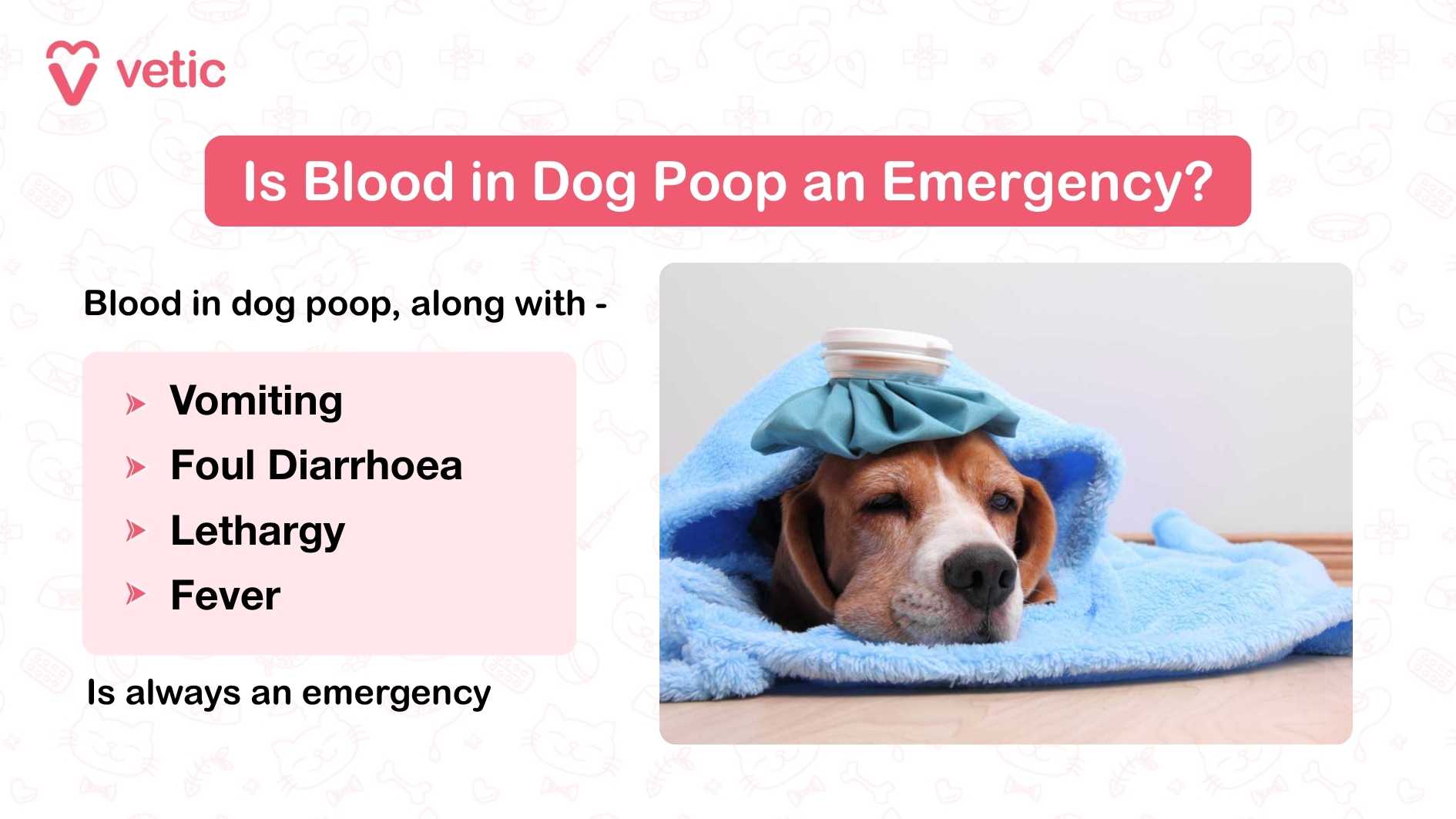
Watch for:
- Pooping large amounts of blood, or very frequent bloody stools.
- Weakness, collapse, or swollen, painful belly.
- Refusing food, ongoing vomiting.
- Bloody stool plus pale gums.
These are signals that your dog needs immediate veterinary attention.
Why Does My Dog Have Bloody Poop? Here are a few reasons why your dog is pooping blood
Eating Something Spoilt or Bad
Puppies are notoriously curious and so are some dogs. They can get into the dustbin or simply pick up a small bone from an unattended plate. These can irritate your dog’s digestive system. For example, something inedible like a bone can poke and irritate their stomach, small intestine or even anal region.
The most common result is the inflammation of the GI tract (gastroenteritis) or acute haemorrhagic diarrhoea syndrome (AHDS).
It is typically caused by items that your pup shouldn’t eat, such as –
- Bones
- Twigs and sticks
- Toys
- Spoilt food
Infections of the GI Tract
Several other types of infections can cause gastroenteritis in dogs and pups, including –
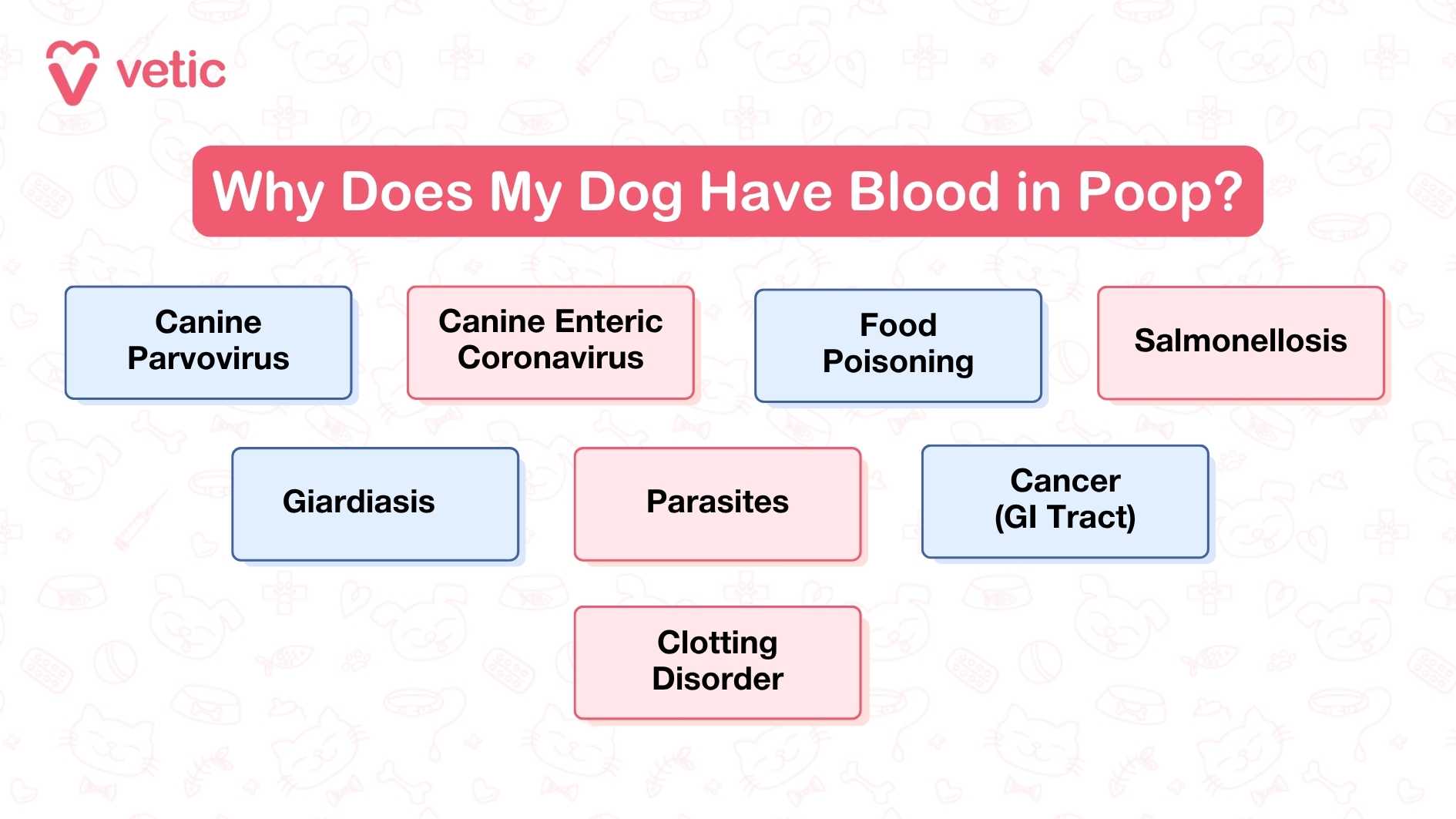
Canine Parvovirus
It is not always the cause of bloody diarrhoea or bloody poop in dogs, but it can’t be ruled out at home without diagnostic testing. Parvo in dogs can be fatal for pups if not treated properly and in time.
Canine parvo can spread through direct contact with the infected poop of other dogs during walks or playtime at the park. If your dog is showing additional signs of lethargy, nausea, along with bloody diarrhoea, you should take them to the emergency veterinarian immediately.
Canine Enteric Coronavirus
It is another viral infection that affects the stomach lining of pups and unvaccinated dogs. The signs are very similar to parvo virus in dogs. At the same time, if your dog doesn’t test positive for parvo, it doesn’t mean they do not have a viral infection.
You need to speak with your veterinarian about testing your pup or dog for canine enteric coronavirus as well. If they test negative, then we can proceed with the other possible causes of bloody poop in puppies and dogs.
Salmonella from Raw Eggs & Meat
Salmonellosis is a serious bacterial infection caused by Salmonella. It causes severe diarrhoea accompanied by vomiting. (Public Health Agency of Canada, 2024) Just like other GI tract infections, salmonellosis can cause lethargy, vomiting, decreased appetite, dehydration and fever. It should not be taken lightly or treated at home without veterinary intervention.
Giardia from Contaminated Food & Water
Giardiasis is a protozoal infection caused by Giardia. It can damage the gastrointestinal tract and cause diarrhoea, sometimes with blood. Other signs of giardiasis are consistent with gastroenteritis, such as weight loss, lethargy, inappetence, dehydration and vomiting.
Parasites like Hookworms, Tapeworms
Excessive worms can definitely cause digestive upsets leading to diarrhoea, vomiting and bloody diarrhoea in dogs. So, if your dog is pooping blood, you need to check if they are also excreting worms (intact or partial) or worm eggs with their stool. Often, heavy worm-load causes dogs to pass worms with their stool.
The type of worm and the treatment will be prescribed by your veterinarian after a thorough analysis of your dog’s poop sample.
Cancer of or Near the GI Tract
Cancer in the digestive tract of the dog can result in bloody stool. A tumour or cancer in the stomach, small intestine, large intestine, colon or anal sac can cause a dog to pass blood in their stool.
The colour and consistency of the stool and blood will depend upon the location of the tumour. If your dog tests negative for all other possible causes of bloody poop, your doctor will likely recommend a USG of their whole abdomen to check for the presence of any growth or mass that can cause blood in poop.
Improper Blood Clotting
It is a less-common cause, but any agent or disease that prevents normal blood clotting can contribute to bloody poop in dogs. For example –
- Bleeding disorders (Dodds, 2005)
- Liver disease
- Kidney disease
- Immune-related thrombocytopenia
- Irritable Bowel Disease (IBD)
- Ulcers in the GI tract
- Addison’s Disease
- Trauma
- Intussusception
- Anal gland infections/impactions
External agents such as consuming toxins (rodenticide, rat-kill) can cause bloody diarrhoea in dogs.
What Should You Do if Your Dog is Pooping Blood and Vomiting?
See a veterinarian without any delay. It can be anything from Canine Parvovirus to a foreign body. Loss of fluid through repeated bloody stools can cause rapid dehydration. Visiting a veterinarian on-time can prevent dehydration and tell you about the actual cause of the bloody stool.
How Does Blood in Dog’s Poop Look?
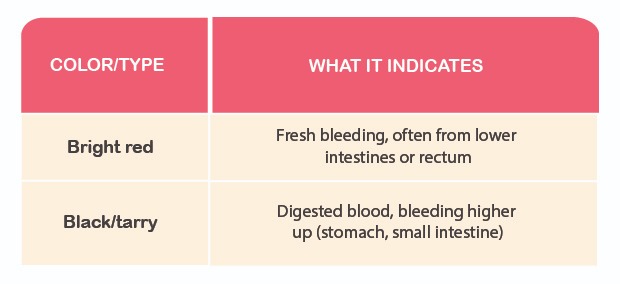
Blood in a dog’s stool can appear in different forms. The colour and appearance help identify where the blood is coming from in the digestive tract.
Hematochezia: Bright Red Blood in Poop
- Bright Red Blood: Indicates bleeding from the lower digestive tract (colon, anus, or rectum).
- Appearance: Blood looks fresh and hasn’t gone through the digestive process.
- Associated Symptoms:
- Often seen with diarrhoea.
- Stool may have a red tint and increased frequency.
- Consistency can range from soft to liquid.
- Sometimes, mucus covers the stool, and blood appears on the outside, indicating an issue with the colon.
Melena: Black and Tarry Poop
- Dark or Black Stool: Suggests blood from the upper digestive tract (stomach or small intestine).
- Melena: The term for dark, tarry stool indicating the presence of digested blood.
- Possible Causes:
- Conditions affecting the stomach or upper intestines like inflammation, ulcers, or cancer.
- Appearance: Stool is usually more solid compared to hematochezia.
Pure Blood in Stool
- No Poop, Only Blood: In some cases, the dog may pass only blood, especially if the stool is liquid or the gut is empty.
What Should You Do If Your Dog Is Pooping Pure Blood?
You should immediately contact your veterinarian and visit the emergency vet irrespective of the time. Pooping pure blood can mean your dog doesn’t have anything in his large intestine and he hasn’t eaten in a while, or a major ruptured blood vessel. All of these are life-threatening conditions that demand immediate medical attention and treatment.
What Should I Do At Home if I Find Blood in My Dog’s Poop?
- Don’t try home remedies. Always call your vet for advice.
- If your dog seems otherwise healthy and you only see a small amount, monitor closely and follow your vet’s instructions.
- Ensure your dog has access to water and stays hydrated.
- If there are any other symptoms, puppies are involved, or the bleeding continues, seek veterinary care immediately.
Why is my dog pooping blood and mucous?
Mucous and blood in dog poop often go hand-in-hand in the cases of gastroenteritis arising from bacterial, protozoal or parasitic infections. The presence of mucous in stool can indicate an irritated gut lining or inflammation. Even severe allergic reactions can cause blood and mucous in your dog’s stool.
Can I Give Bland Food if My Dog Has Blood in Poop?
A bland diet (plain boiled rice and chicken) may be helpful for mild, simple stomach issues but only after talking to your vet. Do not feed this if your dog is vomiting, acting sick, or pooping a lot of blood. Bland food is not a treatment for the cause, just supportive during recovery with veterinary guidance.
Diagnosing Blood in a Dog’s Stool
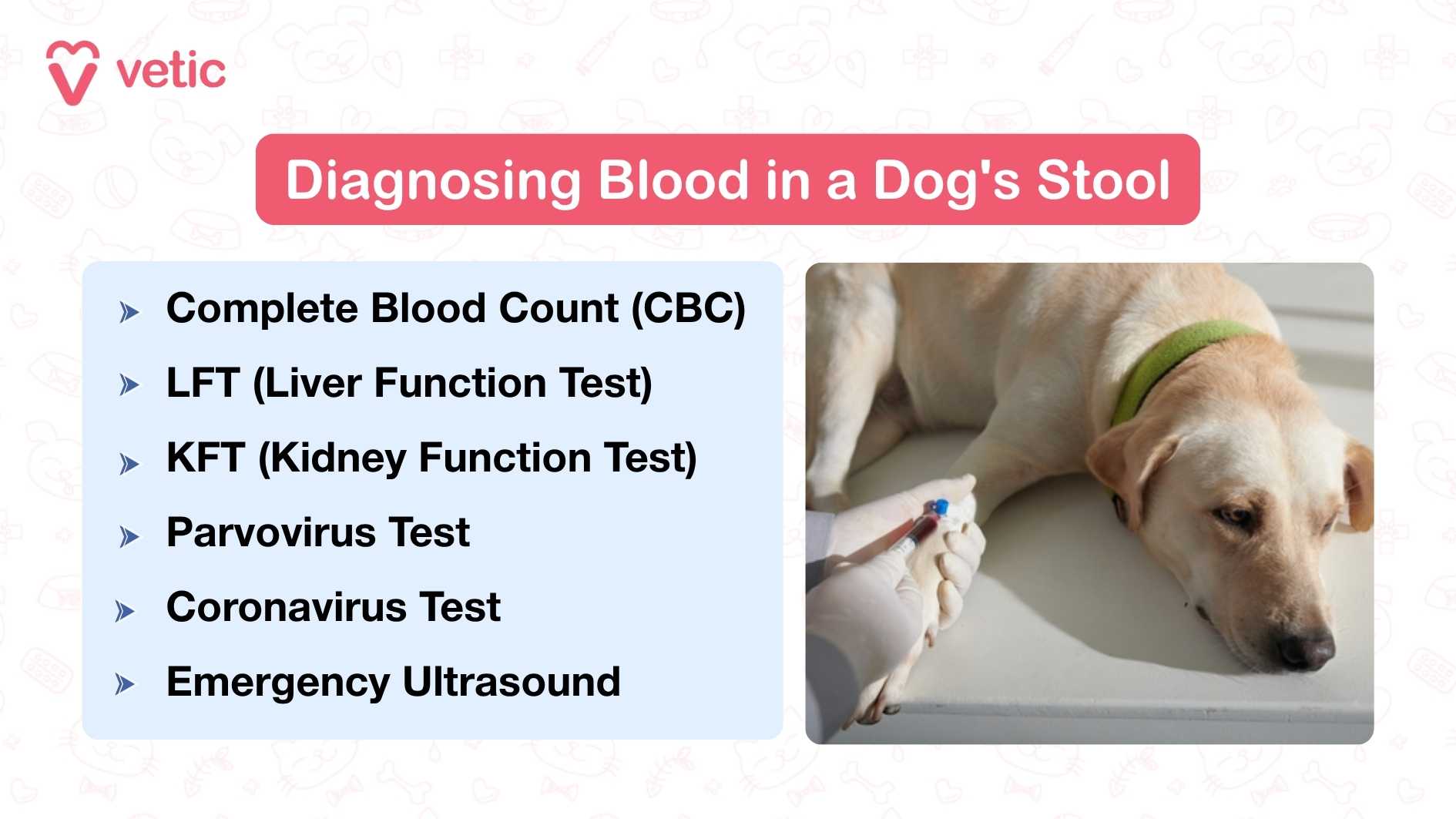
Once you visit the veterinarian they will do a complete physical evaluation, ask about their diet and medical history. Following which they will give you a few blood and stool sample tests these include –
- Complete blood count (CBC)
- LFT
- KFT
- Parvovirus test
- Coronavirus test
If these tests are inconclusive, they will request for an emergency ultrasound that can identify the cause and source of the bleeding.
Treating Bloody Poop in Dogs
For viral infections, such as canine parvovirus and canine enteric coronavirus, the treatment is symptomatic.
For bacterial infections, the veterinarian can recommend additional tests to narrow down the bacteria causing the infection and prescribe antibiotics according to your pup’s body weight.
For protozoal infections, the doctor will first confirm the type of protozoa and then prescribe the medication, which you need to administer at the given dose and frequency.
Other causes such as the ingestion of foreign bodies (Di Palma et al., 2022) or the presence of a mass can require surgery. Similarly, ingestion of something toxic can require intense fluid therapy to flush the toxin out of their system.
Nonetheless, if your dog or pup is dehydrated and has lost a lot of blood, they might require intravenous fluid to replace the fluid loss and an overnight stay at the hospital.
How Is Blood in Poop Treated?
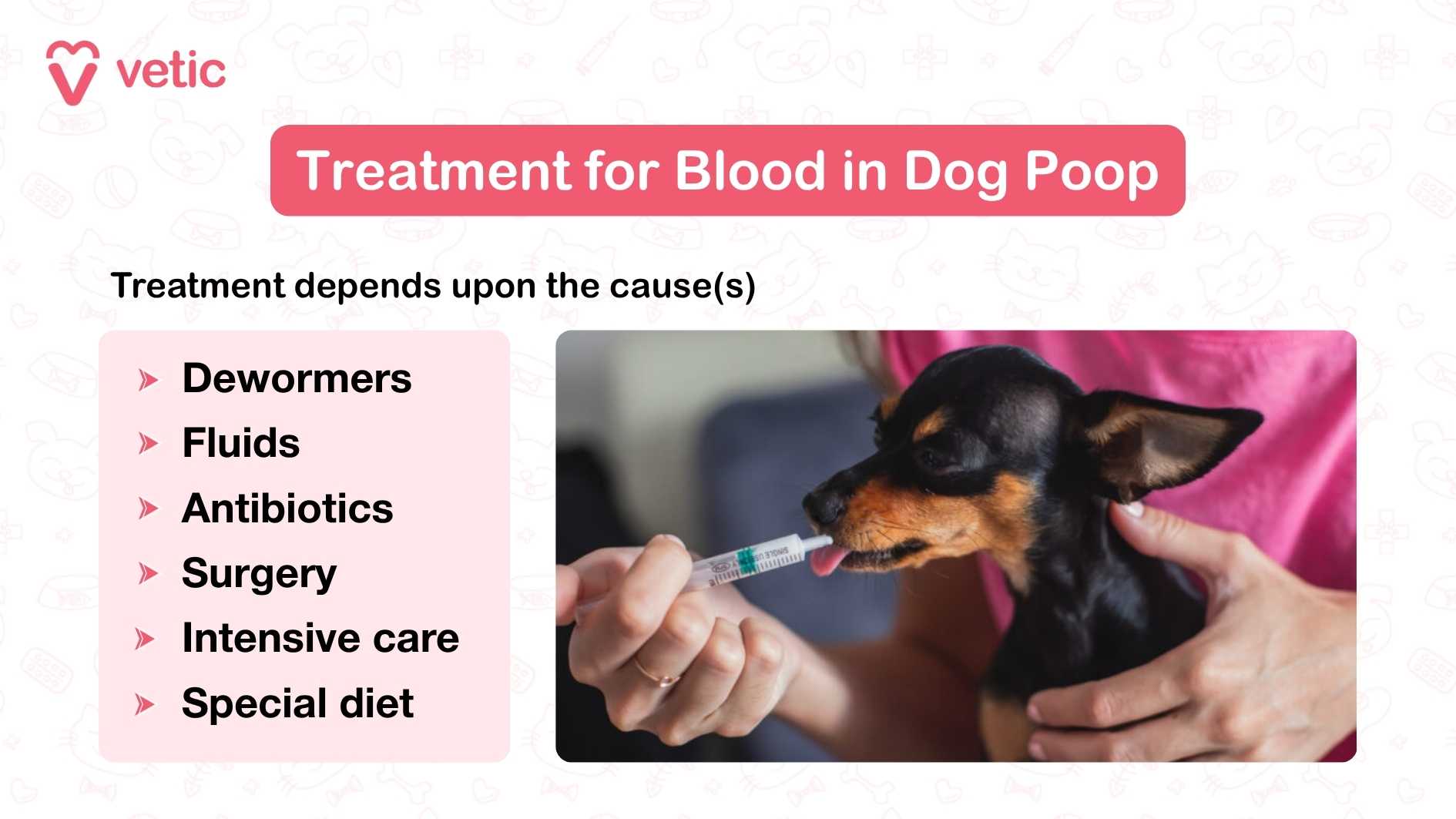
Treatment depends on the cause, and may include:
- Dewormers for parasites.
- Fluids and medication for infections.
- Surgery if there’s a blockage or swallowed objects.
- Intensive care for toxins or severe dehydration.
- Sometimes, special diets for gut healing.
- Hospital care may be needed for severe cases.
How Can I Prevent Blood in Poop of Dogs?
- Keep vaccinations and deworming up to date.
- Don’t let your dog eat trash or spoiled food.
- Watch them during walks and play to avoid swallowing non-food items.
- Change dog food slowly to prevent gut upset.
- See your vet regularly for checkups.
What Will the Vet Do If My Dog Has Bloody Stools?
Your vet will:
- Ask about your dog’s recent foods, habits, and health history.
- Examine your dog and check their gums.
- Run tests on blood and stool.
- May do special virus tests (like for parvo).
- May use x-rays or ultrasound to look for blockages or tumors.
FAQs About Bloody Poop in Dogs
Can dogs poop blood from straining?
That does happen especially if a dog is severely constipated. However, in such cases, the blood is fresh and present in small streaks on their stool. It can also happen if your dog passes an undigested bone piece, small twig or part of a toy. These cause abrasions around the anal region, which leads to the bleeding.
What foods cause bloody stools?
No food should cause bloody stools in dogs. Some human food such as tomatoes and beets can cause their stool to appear “bloody” or red. However, they don’t cause bloody poop in dogs.
Could Blood in Dog Poop Be Caused by Something My Dog Ate?
Yes. Eating bad food, trash, bones, toys, or anything not meant to be eaten can irritate the gut and cause bleeding. Sometimes, red-colored foods can make stool look bloody, but if you’re not sure, always consult your vet.
Can Parasites Cause Blood in Dog Poop?
Definitely. Worms are a common reason, especially in puppies. Your vet can check a stool sample and give the right medicine if needed. Regular deworming is important to prevent this.
How Long Does Blood in Poop Last in Dogs?
Haemorrhagic Gastroenteritis causes vomiting and diarrhoea (often bloody) in dogs. It typically lasts between 2 and 4 days in dogs. It requires prompt diagnosis and correct treatment.
Can stress cause blood in dog poop?
Yes. Stress or anxiety can upset your dog’s digestive system and may cause bloody stool, especially if your pet has been through travel, moving house, or other big changes.
Is blood in dog poop always serious?
Not always, but it should never be ignored. While some mild causes resolve with vet advice, blood in your dog’s stool can also signal a serious issue that needs quick attention.
Should I collect a stool sample before going to the vet?
Yes, if possible. Bring a fresh sample or a photo of your dog’s bloody stool to help your vet diagnose the problem more quickly.
Can blood in dog poop be a side effect of medication?
Yes. Some medicines, especially anti-inflammatories or certain antibiotics, can irritate your dog’s stomach or intestines and lead to blood in the stool.
Can food allergies cause blood in my dog’s stool?
Yes. Food allergies or sensitivities may cause inflammation in the digestive tract, resulting in blood or mucus in your dog’s stool.
Can bloody stool in dogs be contagious?
Yes, some causes like parvovirus, certain bacteria, and parasites can be caught and spread to other dogs or even people in rare cases. Always use caution when handling your dog’s stool and wash your hands well.
References:
Di Palma, C., Pasolini, M. P., Navas, L., Campanile, A., Lamagna, F., Fatone, G., Micieli, F., Esposito, C., Donnarumma, D., Uccello, V., & Lamagna, B. (2022). Endoscopic and Surgical Removal of Gastrointestinal Foreign Bodies in Dogs: An Analysis of 72 Cases. Animals : an open access journal from MDPI, 12(11). https://pmc.ncbi.nlm.nih.gov/articles/PMC9179859/. https://doi.org/10.3390/ani12111376
Dodds, W. J. (n.d.). Bleeding Disorders in Animals. VIN – Veterinary Information Network. https://www.vin.com/apputil/content/defaultadv1.aspx?id=3854231&pid=11196
Public Health Agency of Canada. (2024, March 28). Public Health Notice: Outbreak of extensively drug-resistant Salmonella infections linked to raw pet food and contact with cattle. Canada.ca. Retrieved July 25, 2025, from https://www.canada.ca/en/public-health/services/public-health-notices/2023/outbreak-salmonella-infections-under-investigation.html

